Best high-end electric guitars: Our guide to the best high-end electrics for experts and pro players
Looking for premium electric for rock, metal, blues and beyond? We’ve got the best high-end electric guitars right here
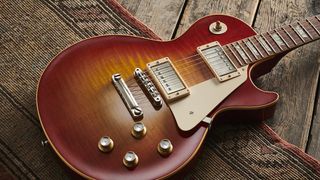
Why should you care about the best high-end electric guitars? Well, we think that every player reaches a point where they need at least one guitar that oozes luxury and class, or they at least have a guitar of this calibre they aspire to own. We're talking the kind of premium instrument that’s guaranteed to turn heads and drop jaws wherever you take it. As we all know, not all axes are made equally – and while that doesn’t mean you can’t find great tones and playability on a budget – sometimes the right combination of exotic woods, master craftsmanship and custom pickups can take your playing that extra level further.
In all fairness, those less versed in the world of guitars might not notice these differences – they might feel any plank of wood with strings will sound pretty much the same and struggle to appreciate why high-end instruments come with such eye-watering high-end price tags.
But those more devoted to the cause will be able to detect the upgrades, from subtle tonal nuances to more obvious aesthetic details. While we’re on the subject of looks, it’s worth noting that PRS have a long-running history of creating instruments that look every bit as beautiful as they sound, with all manner of figured tops and custom finishes to blow our minds. Then, of course, there’s the jaw-dropping work coming out of the Fender Custom shop – whose master builders are unrivalled when it comes to expertise. And the same can be said for instruments being shipped out of Gibson’s Custom factory in Nashville, which perfectly replicate – and occasionally even better – those game-changing instruments which made the company famous in the 50s.
So no matter what kind of music you play, or what kind of tones you are hoping to dial in, here’s a look at the best high-end electric guitars being made right now…
Best high-end electric guitars: Product guide
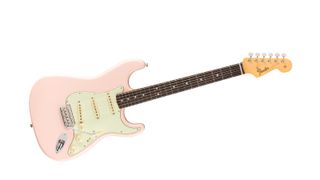
Specifications
Reasons to buy
Reasons to avoid
Rather than being period-correct reincarnations, Fender's Original series aims for a ‘best of decade’ vibe. So, this Strat is alder bodied with a ‘round-laminate’ rosewood fingerboard that was implemented in mid-1962. In a mid-'60s style we get Pure Vintage ’65 Gray-Bottom single coils on an 11-screw mint-green pickguard with aged white controls.
Meanwhile, a concession to modernism is the second, lowest, tone control, which originally would have been for the middle pickup, but here works on both the middle and bridge pickups. Another 'modern' inclusion is the ubiquitous five-way lever switch, which didn’t actually replace the original three-way switch on the Stratocaster until 1977.
We defy anyone who opens a case and sees one of these beauts not to have an ‘OMG’ moment. The guitar that launched thousands of dreams back in the day still impresses decades on. You’ll find these ‘fixes’ on many Fender Custom Shop models, of course, but while these don’t come with any ageing or relic’ing they are significantly cheaper. Yet, viewed from a modern day perspective, it gives Fender’s USA models a rare unity, a vintage nod to the escalating modernism of the Professional and ultra-tweaked and posher Elites.
If you hanker after a new USA-made production Fender and want the most vintage-spec possible, this is it. Vintage-inspired, yes, but with the fixes that many players will embrace.
Read the full Fender American Original '60s Stratocaster review
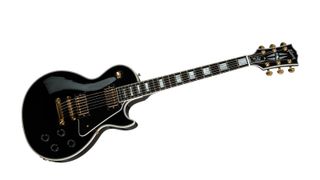
2. Gibson Les Paul Custom
Our expert review:
Specifications
Reasons to buy
Reasons to avoid
Gibson’s flagship Les Paul Custom has graced the hands of some of history’s most memorable guitarists since its inception in the mid-’50s. Obviously, things have changed a little since then. On the surface, the Les Paul Custom is still fairly true to the original ‘tuxedo’ in its appearance, but under the hood it’s a different story.
Gibson’s iconic 490R and 498T pickups adorning today’s Customs provide a modern take on a ‘50s PAF. The result is a smorgasbord of rich, vintage-inspired tones - with enough versatility to see you through virtually any musical scenario. Whether you’re a jazz player after a little more edge or a metalhead looking for something less pointy, a Custom will more than likely fit the bill.
A mahogany body and carved maple top are crucial to a modern Custom’s recipe. The density of mahogany supplies that earth-shaking sustain that we know and love, and the snappy brightness of maple counteracts wonderfully. It’s this balance of dark and light that has kept the Les Paul Custom in the hearts and minds (and hands) of so many musicians for so long.
Granted, for some it’s not the absolute pinnacle of perfection. It’s a heavy thing, even with the weight relief of modern Gibsons, and the 24.75” scale and 12” radius won’t suit everyone. As a representation of the perfect Les Paul though, it doesn’t disappoint.
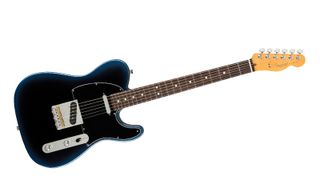
3. Fender American Professional II Telecaster
Our expert review:
Specifications
Reasons to buy
Reasons to avoid
Fender’s ability to always find new ways to update and upgrade their guitars is frankly incredible. Granted, they’ve not reinvented the wheel - but Fender will always find a way to make their guitars appeal to an even wider audience than before.
The American Professional II is similar to its predecessor in most of its specifications, but the few tweaks make this guitar even sweeter than the last. Fender’s popular deep ‘C’ neck now has smooth rolled fingerboard edges for extra playability and comfort, and a ‘Super-Natural’ satin finish to the back of the neck helps the cause. The neck heel has been carefully carved away too, to enable easy access to those upper frets. This is a neat touch from Fender, which makes the whole range feel just a bit more premium.
The electronics also remain archetypally ‘Tele’, but with some slight tweaks. V-Mod II pickups adorn this model, with the same blend of Alnico 2 and 5 magnets as the original Pro series. They’ve been updated however, shaving some of that extra high-end off to allow the midrange to shine through. The tone pot houses a push-push switch to run both pickups in series, and also to provide some extra opportunities for those that need a little extra power behind their tone.
Overall, the American Professional II Telecaster is a fantastic modern Tele. It’s not a guitar for those who want true vintage spec or tone, and it’s not for those who want the most innovative, up-to-date iteration of a Fender either. It’s a guitar capable of much more than you’d expect.
Read the full Fender American Professional II Telecaster review
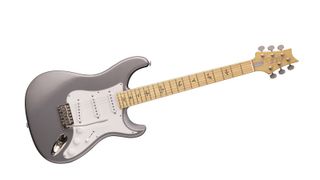
Specifications
Reasons to buy
Reasons to avoid
When it comes to modernising an iconic instrument, you will always divide opinion - and the Silver Sky from PRS has definitely done that since its release in 2018. A brainchild of John Mayer and Paul Reed Smith himself, the Silver Sky strikes the balance between homage and innovation, respecting the classics while also showing us a little glimpse of the future.
Spec-wise, this guitar incorporates the best of vintage and modern. Its 7.25” radius fretboard offers that old-guitar familiarity, with both thumb-over and behind techniques a breeze. The neck is described by PRS as a C/D hybrid, so really comfort is not an issue here. The frets are vintage-spec, and are therefore thinner and shorter than what many might be used to, but feel great to play. There’s more fingertip-on-fretboard contact because of this, which provides great resonance, as well as that typical ‘snap’ we all love from these kinds of guitars. The 635JM pickups are also party to this - a fantastic blend between fat, thin, bright and warm, with some of the harsher overtones dialled out for the modern player.
At this price, the Silver Sky occupies some pretty scary territory for a plain-and-simple bolt-on. However, you’re paying for expertise, world-renowned craftsmanship, and a guitar that is the perfect blend of old and new - and who can put a price on that?
Read the full PRS Silver Sky review
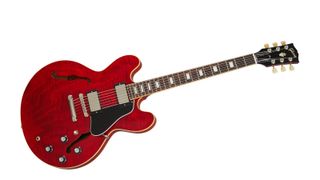
5. Gibson ES-335 Figured
Our expert review:
Specifications
Reasons to buy
Reasons to avoid
Gibson’s ES-335 has always been a stand-out choice in their range. They’ve been played by jazz greats, rock-and-rollers and grunge icons, and nearly everyone in-between.
An ideal blend of form and function, this ES-335 features a maple centerblock and Adirondack spruce bracing. Not only does this reduce feedback at high volumes, but also increases sustain - providing you with that rich, full tone that the 335 is known for. The quarter sawn mahogany neck and rosewood fingerboard also accentuate this incredible depth of tone; you feel the whole thing come alive under your fingers, humming with excitement.
Speaking of humming, that’s not something you need to worry about with this ES-335, as Gibson have armed it with a pair of calibrated T-type humbuckers. They’re a medium-output humbucker that reinforces that brilliant warmth of the semi-hollowbody, but can also be brought to life with a touch of overdrive. The expressive nature of this guitar running through a slightly hot amp is something of true wonder.
Granted, this guitar isn’t cheap - but in return you get a spectacularly versatile and sophisticated instrument that will take just about anything you throw at it. Don’t throw anything at it, though.
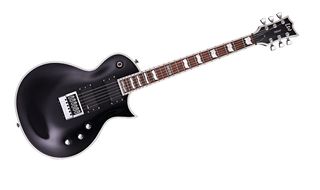
Specifications
Reasons to buy
Reasons to avoid
The EC-1000ET is an all-mahogany single-cut loaded with a set of EMG 81 and 60 active humbuckers, a comfortably modern neck and a high level of construction quality. Its key selling point, however, is a fitted EverTune bridge - unlike other tuning systems, it doesn't tune your guitar for you or offer altered tunings. Instead, once set and tuned, it simply aims to stay there, thanks to a series of tension-calibrated springs and levers. We tried everything we could to knock it out of whack: huge, three-step bends, wildly exaggerated string stretching... we even put the guitar into a freezer. It came back perfectly in tune every single time.
What's more, a guitar that's perfectly tuned and intonated up and down the neck seems to play much more musically. We're not aware of any tone compromises, either. The EC sounds as full and aggressive as ever, with the more mellow tones of the neck EMG being pleasantly rounded, and all bereft of any metallic spring clank. If never going out of tune is important to you, this is one of the best high-end electric guitars going.
Read the full LTD EC-1000 EverTune review
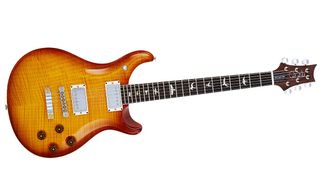
Specifications
Reasons to buy
Reasons to avoid
The McCarty Model - named after Theodore 'Ted' McCarty, Gibson's president during its 1950s to 1960s heyday and, much later, 'mentor' to Paul Reed Smith - originally appeared in the early 1990s and was the company's first attempt at a more vintage-informed guitar. It takes its name, primarily, from its scale length of 24.594 inches.
However, the focus of the 594 is not just that scale length but a desire to recreate, as closely as possible, the 'holy grail' of vintage Gibson tone - a 1959 Sunburst, but in a modern double-cut guitar. A change comes with the pickups, which are PRS's latest date-series 58/15 humbuckers but with an 'LT' (Low Turns) suffix, which on a meter shows the bridge unit to have a lower DC resistance than the standard McCarty's 58/15, although the neck pickup seems virtually identical.
The four-control layout (the first PRS double-cut guitar to use it) possesses the classic LP setup and feels immediately comfortable to any player used to the much-copied Gibson layout. Full humbucking, or with the partial coil splits engaged, full volume, half volume, tones rolled off - not to mention the shades with both pickups on - there's not a duff sound that we can find. Dynamic, expressive - it purrs, it roars.
Read the full PRS McCarty 594 review
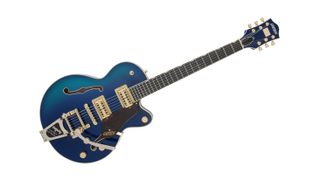
Specifications
Reasons to buy
Reasons to avoid
Play a classic 6120 or Duo Jet and it can seem a bit, well, old-fashioned. A growing number of players desire the brand’s looks, sound and unmatched vibe, but also want something a tad more versatile and user-friendly. Enter this latest Players Edition model with its neck set lower into the body for improved access, higher-output Filter’Tron-style humbucking pickup (Full’Trons) and a modernised Bigsby vibrato where through-stringing replaces the notorious ‘hooking the ball-end over a peg’ system that scuppered any chance of a quick change.
Mate these modern tweaks with another recent innovation (for Gretsch, at any rate), the Centre Block range, and you have a guitar ready to compete with anything out there - in virtually any style.
Read the full Gretsch G6659TG Players Edition Broadkaster Jr review
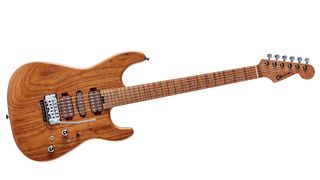
Specifications
Reasons to buy
Reasons to avoid
This Charvel is the signature model for Guthrie Govan, widely regarded as one of the finest guitarists around. Its caramelized ash body model is also up there with the finest bolt-ons we’ve ever played. The neck is extremely tight-fitting and held in place with four screws, each recessed into the contoured heel. Like any HSH set up you have huge choice on exactly how you wire it - this is no different. While the outer positions select the full humbuckers, position two voices bridge (slug single coil only) and the middle single coil; position three gives us bridge and neck (both slug single coils); position four offers the screw single coil of the neck pickup with the middle pickup.
A ‘secret’ two-way mini toggle that simulates a coil-split via an old-school passive filter (a 0.1 microfarad capacitor). In many ways this feels more like high performance rifle, not a guitar. It gives off a tuned-to-perfection vibe that’s like an instrument you’ve owned for a while, gigged, modified and tweaked. Which in reality is exactly what it is, only Charvel and Guthrie Govan have done it for us.
But don’t dismiss this as a virtuoso rock shredder axe. Yes, if your technique is up to it, you won’t have a problem there and using just the bridge pickup you’ll probably have all you need: big and ballsy, a hint of a cocked wah-like high end it’s certainly in the JB area. But it’s offset by a pokey PAF-like neck voice, tube-y and soupy but far from one dimensional.
If that was it, we’d be smiling. But there’s plenty more... Guthrie Govan’s vision for an all round workhouse that’ll stand up to the rigours of professional touring is superbly realised in this signature. Every detail is wonderfully considered. It’s not a cheap date, but it’s an astonishing guitar: a player’s tool of the highest calibre.
Read the full Charvel Guthrie Govan Signature review
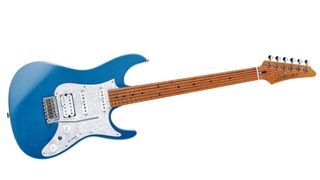
Specifications
Reasons to buy
Reasons to avoid
By design, the AZ series is all about function: a tool to do a job. That said, both the body and neck adopt a more vintage bolt-on guise that’s less pointy, more classic than we’re used to from Ibanez. There's also a completely new set of AZ-exclusive pickups: the Seymour Duncan Hyperion. This HSS guitar also has the dyna-MIX 9 system introduced by a two-way mini-toggle ‘Alter’ switch placed between the master volume and tone controls, yielding a whopping nine pickup sounds.
For the player wanting to cover virtually everything from jazz to shred, well, Ibanez has pretty much done it. This is a seriously versatile, good-sounding, tidily made instrument that puts Ibanez squarely back into the mainstream.
Read the full Ibanez Prestige AZ2204 review
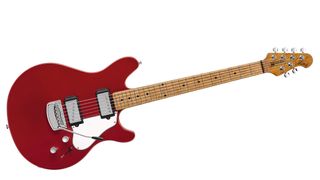
Specifications
Reasons to buy
Reasons to avoid
James Valentine of Maroon 5 has a strong idea of what he wants in a guitar and so, along with the craftsmen at Music Man, has created his dream machine. Valentine's desire was for a guitar that blends innovation and a modern vibe, with a reassuringly classic appeal - a bit Gibson semi, a bit Fender Tele perhaps. So, with that in mind, an ash body - in this instance finished in what Valentine calls 'Trans Buttermilk' ('Trans Maroon' is, of course, available, too) - has been mated to a nutty-looking roasted maple neck. This is delightfully figured and comes with Music Man's proprietary wax and oil finish for a tactile but drag-free experience. Build and finish are, as always, dead on.
Pickups and controls are interesting: while both pickups are standard humbucking size, the bridge unit is actually single coil, its pole pieces slanted like a Tele or Strat across the chrome cover. Controls are simple, but with a couple of neat twists in the form of push-push pots on both controls - an active boost of up to 20dB on the volume, and a coil-split for the neck humbucker on the tone. We like the 'hidden' nature of these sonic extras, because it adds genuine usability but keeps things uncluttered and intuitive.
The Valentine looks familiar but just different enough, feels great sitting or standing, boasts a real player's neck, and its palette of tones - delivered in a fuss-free manner by a clever control and switching setup - is simply superb. Of the hundreds of models that have sought to blend humbucking and single coil tones, this has to be one of the best.
Read the full Ernie Ball Music Man Valentine review
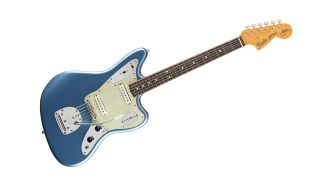
Specifications
Reasons to buy
Reasons to avoid
Rarely have we come across a redesign of a classic instrument that is so thorough… yet still adheres so closely to the original! Neck shape, body contouring, hardware, pickups and electronics have all been under the microscope of Marr and his design cohorts in redesigning this short-scale offset classic. The new bridge design swaps the threaded rod saddles of the Jaguar for the bigger, solid, non-height adjustable Mustang saddles that sit flush on the bridge tray. The saddles just have a centre-placed string groove but this increased width means there's very little gap between the low E and the outer edge of the fingerboard the further up the neck you go.
Marr has also ditched the traditional dual rhythm/lead concept. This Jag has just one circuit: standard volume and tone controls and a four-position lever switch mounted on the smaller of the three chromed plates. In position one, it offers just the bridge pickup; position two, bridge and neck pickups (in parallel); position three, neck pickup; and lastly position four, neck and bridge pickups (in series). We still have the slide-switch style of the original Jaguar to engage not one, but two, of the original's high-pass filters. The top switch is the master filter (up engages the cut); the lower switch, mounted at a right angle, only works on position four where forward is on (ie, it introduces the cut). Both these switches stick up less than the standard slide switches too, and are slightly more comfortable: typical of the thought and detail that has gone into this guitar.
There's Fender-aplenty in the sounds but, as Marr says, Gretsch and Rickenbacker spring to mind, especially with a little tone roll-off. Above all though, the clarity, and the musical sweetness of the tones allow for complex chord voicings for jazzier rhythms or simpler soul and funk styles. The Johnny Marr Jaguar is a thorough redesign from the perspective of a very busy working guitarist. Aside from the low E being rather too close to the fingerboard edge in higher positions, it's faultlessly built for purpose, addresses five decades of 'Jaguar-ness' and puts a decidedly leftfield design squarely back in the mainstream.
Read the full Fender Johnny Marr Jaguar review
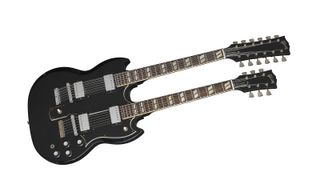
13. Gibson Slash 1966 EDS-1275 Doubleneck Signed/Aged
Our expert review:
Specifications
Reasons to buy
Reasons to avoid
When it comes to Gibson double-necks, the first two players that come to mind are undoubtedly Jimmy Page and Slash. And if you’ve ever seen footage of Guns N’ Roses on their Use Your Illusion World Tour – or, better still, managed to catch them live in the flesh during the early 90s – you’ll know Slash would pick up an SG-style double-neck for songs like Knockin’ On Heavens Door and Patience, as well as Alice Cooper cover Only Women Bleed.
This Custom shop replica of his 1966 EDS-1275, bought from a small music store in Indiana in 1990, is a faithful recreation of his legendary instrument – offering a conventional six-string guitar neck underneath a 12-string neck for maximum chime and chorus. And though it looks like you’d have the weight of the world around your neck, the 1-piece lightweight mahogany body makes it deceptively comfortable for an instrument of this ilk.
Limited to just 125 worldwide, each of these guitars is hand-signed and numbered, including a vintage replica hardshell case, a custom Slash concho strap plus a Certificate of Authenticity. So what are you waiting for?
Best high-end electric guitars: Buying advice
Okay – so you might have come into some money or gotten that big promotion at work or simply might have amassed enough for a high-end electric after a long period of saving up. Now you’ve found yourself wondering which model will be the right one for you. Of course the downside to any big investment is knowing how many more affordable guitars you could have bought for the same amount of money – but it’s worth remembering that owning one premium instrument is often much better than having, say, five or so average ones. American-made guitars generally hold their value better too, and in some cases, even increase year on year – especially if part of a limited run with the certificate to prove it.
- The best electric guitar strings: string sets for all styles and budgets
- The best guitar amps: combos, heads and pedalboard amps
There’s no competing with the history of Gibson and Fender – two brands that created the template for the modern electric guitar in the 50s and continue to innovate to this day. Both companies reserve all their finest woods for the Custom Shop, so you’d be guaranteed the best tones money can buy with anything their luthiers have put their experience and passion into.
- Best Stratocasters: our pick of the best Fender Stratocasters
- Best Telecasters: top Fender Telecasters for all budgets
PRS Guitars, founded in 1985, might not have quite the same in terms of legacy but few would deny their notoriety for creating instruments that raised the bar in terms of performance, tone and aesthetics. These instruments may feel a little more modern compared to Gibson or Fender designs, but they’re every bit as elegant, perhaps even more so. Then, of course, there are the other brands too – perhaps less associated with high-end instruments but still with highly impressive output at flagship and Custom Shop level. The Guthrie Govan signature from Charvel, for example, was made for a musician considered by many to be the greatest living guitar player on earth – the perfect tool for uncompromising musicianship and modern functionality, carefully balanced against vintage class. So there's plenty to think about... here’s our round-up of the best of the best high-end electric guitars.
Find out more about how we test music gear and services at MusicRadar.
- The best high-end acoustic guitars: pro-quality for serious players

“It’s about more than just a guitar – this is about giving players a platform to express their individuality”: Fender celebrates 50 years of Hello Kitty with super-kawaii Squier Strat, fuzz pedal and collectible accessories

“The overall quality of sound, not least for the price, is exceptional": PRS SE Custom 24 Semi-Hollow Piezo review
Get the MusicRadar Newsletter
Want all the hottest music and gear news, reviews, deals, features and more, direct to your inbox? Sign up here.
Jonathan Horsley has been writing about guitars and guitar culture since 2005, playing them since 1990, and regularly contributes to MusicRadar, Total Guitar and Guitar World. He uses Jazz III nylon picks, 10s during the week, 9s at the weekend, and shamefully still struggles with rhythm figure one of Van Halen’s Panama.

“It’s about more than just a guitar – this is about giving players a platform to express their individuality”: Fender celebrates 50 years of Hello Kitty with super-kawaii Squier Strat, fuzz pedal and collectible accessories

“The overall quality of sound, not least for the price, is exceptional": PRS SE Custom 24 Semi-Hollow Piezo review